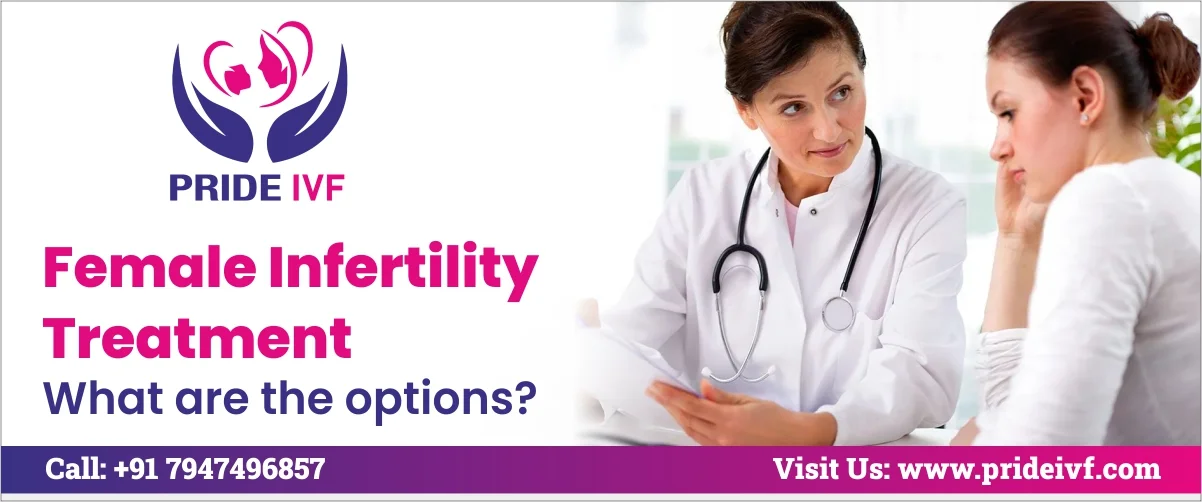For countless women around the world, the journey to motherhood can be fraught with emotional challenges and obstacles. Female infertility, a deeply personal and sensitive topic, is not an isolated issue; it reverberates through every aspect of a woman’s life.
The weight of unfulfilled desires, societal pressures, and the constant stream of baby announcements can take an immense toll on one’s emotional well-being. It is vital to recognize and empathize with the experiences of women facing this daunting reality.
However, infertility can be a result of either male factors, female factors, or a combination of both. In this blog, we will focus primarily on female infertility treatment options. Pride IVF Centre in Delhi stands ready to empower women, providing personalized care and cutting-edge treatments.




Infertility Explained
Female infertility meaning, the inability to conceive after a year of regular, unprotected intercourse. This condition affects a significant number of couples, shattering dreams, and reshaping expectations.
Within the realm of female infertility, there are two distinct categories: primary infertility and secondary infertility. Primary infertility refers to the inability to conceive and carry a pregnancy to term, even after a year of regular unprotected intercourse without any prior successful pregnancies. On the other hand, secondary infertility describes the challenge of conceiving again after the successful delivery of a previous child.
Both primary and secondary infertility can be emotionally trying. For those struggling with primary infertility, there is an added burden of uncertainty and a sense of “Why me?” Secondary infertility, while having experienced the joy of childbirth before, brings its unique set of complexities, as individuals grapple with feelings of guilt for wanting another child and the desire to complete their family.
Diagnosing Female Infertility
Acknowledging and accepting the possibility of infertility is a pivotal first step in the journey toward parenthood. Seeking professional help from a fertility specialist is vital for an accurate diagnosis. Numerous factors can contribute to female infertility, including ovulation disorders, blocked fallopian tubes, endometriosis, hormonal imbalances, and age-related factors.
Fertility infertility test and evaluation is comprehensive and may include hormone level assessments, pelvic ultrasound, hysterosalpingography (HSG) to check fallopian tube patency, and other specialized tests based on individual circumstances. Remember, infertility is not a diagnosis; it is one of the fertility infertility symptoms of an underlying condition that can often be treated.
Female Infertility Treatment Options
Lifestyle Changes
While medical interventions play a crucial role in female infertility treatment, lifestyle modifications can significantly impact fertility outcomes. Maintaining a healthy body weight, consuming a balanced diet rich in fertility-boosting nutrients, and staying physically active are all essential aspects of promoting reproductive health.
Managing stress and prioritizing self-care is equally significant. Stress can have profound effects on hormonal balance, potentially impacting ovulation and menstrual regularity. Integrating relaxation techniques, such as mindfulness, meditation, or yoga (fertility yoga poses), into daily routines can help support emotional well-being throughout the fertility journey.
Ovulation Induction
Ovulation disorder is one of the common causes of female infertility. In cases where ovulation is irregular or absent, ovulation induction may be recommended. Ovulation induction involves the use of medications to stimulate the ovaries, encouraging the release of mature eggs.
Certain medications are often prescribed to regulate ovulation. These drugs work by stimulating the production of follicle-stimulating hormone (FSH) and luteinizing hormone (LH), essential for triggering ovulation.
Close monitoring of ovulation through blood tests and ultrasounds ensures precise timing for intercourse or other fertility procedures. Ovulation induction has been successful for many women and is often an initial step before considering more advanced female infertility treatments.
Intrauterine Insemination (IUI)
Intrauterine Insemination (IUI) is a common and less invasive female infertility treatment that can assist couples in achieving pregnancy. IUI involves the collection and processing of sperm to concentrate the healthiest and most motile sperm for insemination directly into the uterus.
This procedure is often recommended for couples with male factor infertility or unexplained infertility cases. IUI can also be combined with ovulation induction, increasing the chances of successful conception. While IUI may not be the ideal choice for everyone, it offers a more accessible and cost-effective treatment option for many couples.
Assisted Reproductive Technologies (ART)
For some couples facing more complex fertility challenges, Assisted Reproductive Technologies (ART) offer hope for achieving parenthood. The most well-known ART procedure is In Vitro Fertilization (IVF). IVF involves the fertilization of eggs with sperm in a controlled laboratory setting, resulting in embryos that are later transferred into the woman’s uterus.
The IVF process includes several stages, such as ovarian stimulation, egg retrieval, fertilization, embryo culture, and embryo transfer. The success rates of IVF have improved significantly over the years, thanks to advancements in technology and medical understanding.
Despite the promising outcomes of IVF, it is essential to recognize that it may not guarantee a successful pregnancy for every individual. Managing expectations and understanding the emotional impact of IVF is crucial for navigating the process with resilience and optimism.
Lets get started
Advanced ART Techniques
Intracytoplasmic Sperm Injection (ICSI) is a specialized ART technique often used when male factor infertility is a contributing factor. During ICSI, a single sperm is directly injected into an egg, increasing the likelihood of fertilization. This targeted approach overcomes certain barriers that prevent natural fertilization.
Preimplantation Genetic Testing (PGT) is another advanced ART technique that allows for the screening of embryos for genetic abnormalities before transfer. PGT enables the selection of healthy embryos, reducing the risk of miscarriage and certain genetic conditions.
Furthermore, egg freezing has emerged as a revolutionary option, offering women the opportunity to preserve their fertility. Egg freezing is particularly relevant for women facing cancer treatments, those with medical conditions affecting their fertility, or those who wish to delay childbearing for personal reasons.
Third-Party Reproduction
Third-party reproduction offers hope to individuals and couples unable to conceive using their own gametes. Donor eggs or sperm, as well as gestational surrogacy, are viable options for building a family.
Donor eggs provide a viable solution for women with poor egg quality or diminished ovarian reserve. With advancements in egg-freezing technology, women can also choose to use their younger, healthier eggs, preserving their genetic material for future use.
Gestational surrogacy involves another woman carrying the intended parents’ embryo to term. This option is often considered when a woman is unable to carry a pregnancy due to medical reasons or recurrent pregnancy loss.
While third-party reproduction brings new possibilities, it also presents complex emotional and ethical considerations. Open and honest discussions among all parties involved are essential in navigating the intricacies of third-party reproduction.
Surgical Interventions
In certain cases, structural abnormalities or medical conditions may impede conception. Surgical interventions, such as hysteroscopy and laparoscopy, can help identify and correct these issues, increasing the chances of pregnancy.
Hysteroscopy is a minimally invasive procedure that allows the doctor to examine the uterine cavity and, if necessary, remove polyps, fibroids, or scar tissue that may be hindering implantation.
Laparoscopy is another minimally invasive surgical technique that involves the insertion of a thin, lighted scope through small incisions in the abdomen. Laparoscopy allows for the diagnosis and treatment of conditions such as endometriosis treatment, blocked fallopian tubes treatment, and ovarian cysts.
Emotional and Psychological Support
Navigating female infertility can be an emotionally overwhelming experience. Seeking support from loved ones, joining support groups, or attending counseling sessions can provide a safe space to express feelings and connect with others who understand the challenges of infertility. Engaging in activities that bring joy and relaxation can alleviate emotional burdens, fostering resilience and hope during this demanding journey.
Conclusion
Understanding the nuances of female infertility, exploring treatment options, and seeking emotional support empowers women to navigate this challenging path with hope. Infertility does not define one’s worth; motherhood transcends biology, encompassing love and care. As science advances, the landscape of female infertility treatments evolves, offering new possibilities. With increased awareness and accessibility.
Let’s foster a community of understanding and compassion, extending a hand of hope to those in need. Together, we celebrate the resilience that defines the human spirit, making dreams come true at Pride IVF Centre—one hope at a time.




